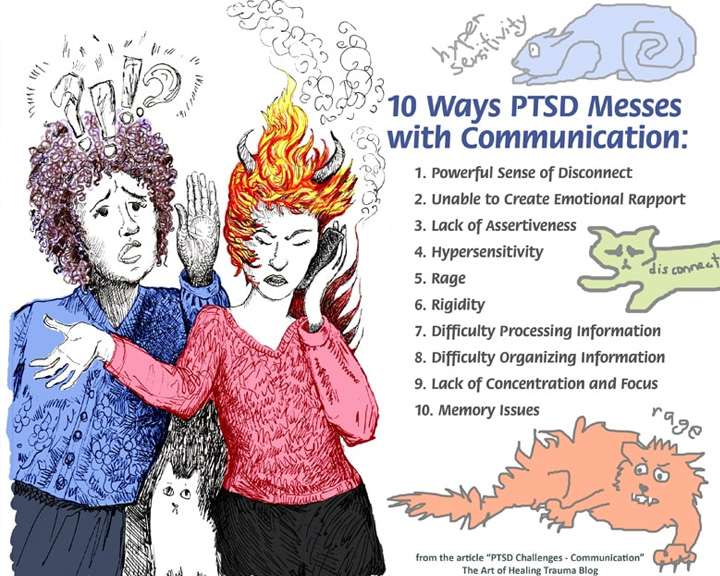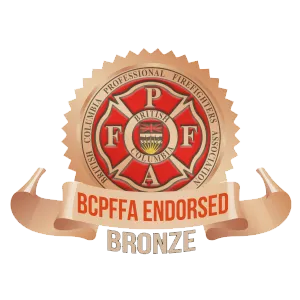Communication & Relationships

Communication in general can be a difficult skill to master. Finding ways to say just the right thing and trying to express yourself in a way that you feel heard or understood can be challenging. Connection and belonging is a basic human need but it can be difficult to create this through the complexities of communication, since there can be different interpretations for just about anything said. When you have experienced trauma, communication can become even more challenging.
Some of the ways PTSD and trauma can get in the way of communication are:
(http://www.new-synapse.com/aps/wordpress/?p=1614).
One of the most common barriers to good communication is poor listening skills. If you have ever played the telephone game you understand how quickly a statement can change when passed through different people. We often listen to respond rather than listening to hear. Julian Treasure shares the importance of conscious listening in his ted talk (https://youtu.be/cSohjlYQI2A). He believes that every person needs to listen consciously in order to live fully. Listening is our access to understanding, when we stop and truly listen to what someone is saying and not spend the whole time thinking of a response, we begin to get a different understanding of what is being said.
Childhood experiences play a large role in how we perceive information and communicate with others. The messages we received as children inevitably show up in our adult life. As children we are highly influenced by our parents and our experiences. This video is a good example of how our childhood shapes us into the adults that we are today (https://youtu.be/zn7Q0m_o-Xs). As a result of these experiences we are also more inclined to choose partners that reinforce our experiences as children. This video helps you to understand your different love styles, which ultimately stems from your childhood attachment styles to your parents (https://youtu.be/kghYboB21t8). Having a better understanding of why we may have difficulty communicating with our partner can help you begin to learn new ways to communicate and cope with conflict. With a little practice your communication skills can improve, here is a guide to learning communication skills for healthy relationships. (https://www.wfm.noaa.gov/workplace/EffectivePresentation_Handout_1.pdf)
Conflict can be the hardest part of communication to navigate for some individuals. Conflict in a relationship is healthy, not knowing how to navigate it and find resolution in the conflict is where it becomes complicated. Some tips to navigating conflict in your relationship:
- Focus on the problem, not the person – When a disagreement turns to personal insults, raised voices, or mocking tones, the conversation is no longer productive. Be careful to focus on the problem without placing blame on your partner. If a disagreement becomes personal, you should pause the conversation.
- Reflective listening – Oftentimes during arguments we focus on getting our own point across rather than listening to our partner. Before responding to your partner, restate what they have said to you in your own words. Continue this process until your partner agrees with that you understand. Next, share your side. Your partner should reflect back your ideas in their own words until they too understand. Using this technique will help both individuals feel listened to and understood, even if you disagree.
- Use “I” statements – When sharing a concern, begin your sentence with “I”. For example: “I feel hurt when you don’t tell me you’ll be late”. With this sentence format we show that we are taking responsibility for our own emotion rather than blaming our partner. The alternative sentence-“You never tell me when you’re going to be late” – will often cause a partner to become defensive.
- Know when to take a time out – When you and your partner are becoming argumentative, insulting, or aggressive, it is a good idea to take a time-out. Have a plan in place so you or your partner can call for a break when needed. Spend some time doing something alone that you find relaxing. When you’ve both calmed down, you and your partner can return to solving the problem. Be sure that you do return – it isn’t a good idea to leave these issues unaddressed.
- Work toward a resolution – Disagreement is a normal part of a relationship. If it becomes clear that you and your partner will not agree, focus on a resolution instead. Try to find a compromise that benefits both individuals. Ask yourself if this disagreement really matters to your relationship, and let yourself move on if not.
(https://www.therapistaid.com/worksheets/relationship-conflict-resolution.pdf)
Published on January 20, 2020
Derek Sienko, M.A. in Military Psychology (candidate), BSW., R.R.P., C.V.R.P



